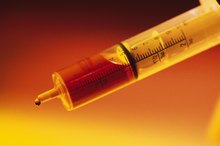Tests that evaluate liver function include several enzymes found in the heart, skeletal muscle and red blood cells in addition to the liver 4. The greatest concentration of alanine aminotransferase, sometimes called ALT or sometimes SGPT and aspartate aminotransferase, also called AST or SGOT occurs in the liver. Damage to the liver cells causes ALT and AST to leak into the bloodstream. Normal levels of ALT range from 7 units to 56 units per liter, while normal levels of AST range from 5 units to 40 U/L, according to the Lab Tests Online website 12. Several types of liver disease cause elevated liver enzymes.
If you are experiencing serious medical symptoms, seek emergency treatment immediately.
Causes
A number of diseases can damage the liver, ranging from acute, temporary elevations to chronic mild elevation. Nonalcoholic fatty liver disease, commonly called NASH, mostly occurs as a result of overweight or diabetes. Other medications such as cholesterol-lowering medications can also cause liver enzyme elevations. Acute hepatitis A, drug poisoning or overdose with acetaminophen can cause a sudden, very high increase in liver enzymes, more than 10 times the normal range, the Lab Tests Online website says 124.
Hepatitis B and C often cause chronic mild to moderate rises of up to four times the normal range. Alcoholic liver disease causes chronic elevations, with a AST/ALT ration greater than 1:1 often indicating alcoholic liver disease. Acute infections such as mononucleosis and cytomegalovirus can cause very high liver enzymes. Genetic disorders can also cause elevated liver enzymes.
- A number of diseases can damage the liver, ranging from acute, temporary elevations to chronic mild elevation.
- Alcoholic liver disease causes chronic elevations, with a AST/ALT ration greater than 1:1 often indicating alcoholic liver disease.
Signs
Elevated Liver Enzymes & Itchy Skin
Learn More
A medical practitioner observes signs of a disease process. Signs that accompany elevated liver enzymes depend on the disease, but can include:
- jaundice
- a yellowish tinge to the skin
- whites of the eyes
- dark colored urine
- clay-colored stools
- fluid accumulation in the abdomen called ascites
- intestinal bleeding
- low-grade fever or weight loss
The liver and spleen may feel larger than normal.
Symptoms
People with elevated liver enzymes may not have any symptoms in the case of NASH, early alcoholic liver disease or chronic hepatitis B or C. If acute liver disease causes elevated liver enzymes, symptoms may include fatigue, nausea, vomiting, upper right quadrant abdominal pain and tenderness, loss of sex drive, mental changes or itching 4.cause:
- People with elevated liver enzymes may not have any symptoms in the case of NASH
- early alcoholic liver disease or chronic hepatitis B or C
If acute liver disease causes elevated liver enzymes
symptoms may include fatigue
nausea
vomiting
upper right quadrant abdominal pain
tenderness
loss of sex drive
* mental changes or itching 4.
Related Articles
References
- Lab Tests Online: AST
- Lab Tests Online: ALT
- Boston Children’s Hospital. Liver failure: symptoms and causes.
- Cincinnati Children's Hospital Medical Center. Acute liver failure. Updated November 2018.
- Kumar S. Overview of Acute Viral Hepatitis. Merck Manual Consumer Version. Updated October 2019.
- Cleveland Clinic. Liver Failure. 2018.
- Stanford Health Care. Chronic Liver Disease.
- Stanford Health Care. Cirrhosis symptoms.
- Kalaitzakis E. Gastrointestinal dysfunction in liver cirrhosis. World J Gastroenterol. 2014;20(40):14686-14695. doi:10.3748/wjg.v20.i40.14686
- El Hadi H, Di Vincenzo A, Vettor R, Rossato M. Cardio-Metabolic Disorders in Non-Alcoholic Fatty Liver Disease. Int J Mol Sci. 2019;20(9):2215. doi:10.3390/ijms20092215
- Tholey D. Liver Failure. Merck Manual Consumer Version. Updated January 2020.
- National Institute on Drug Abuse. Types of Viral Hepatitis.
- Centers for Disease Control and Prevention. Hepatitis D. Updated June 13, 2019.
- Reuben A, Koch DG, Lee WM. Drug-induced acute liver failure: results of a U.S. multicenter, prospective study. Hepatology. 2010;52(6):2065-2076. doi:10.1002/hep.23937
- Cincinnati Children's Hospital Medical Center. Autoimmune Hepatitis.
- MedlinePlus. Fatty Liver Disease. Updated November 19, 2019.
- Johns Hopkins Medicine. Common Characteristics of Liver Disease.
- Stanford Health Care. Liver Function Tests for Chronic Liver Disease.
- National Institute of Diabetes and Digestive and Kidney Diseases. Liver Transplant Surgery. 2017.
- Gustot T, Jalan R. Acute-on-chronic liver failure in patients with alcohol-related liver disease. J Hepatol. 2019;70(2):319-327. doi: 10.1016/j.jhep.2018.12.008.
- Thorsen T, Solheim JM, Labori KJ, Line PD, Aandahl EM. Liver transplantation as a lifesaving procedure for posthepatectomy liver failure and iatrogenic liver injuries. Langenbecks Arch Surg. 2019;404(3):301-308. doi:10.1007/s00423-019-01780-3. Epub 2019 Mar 30.
Writer Bio
A registered nurse with more than 25 years of experience in oncology, labor/delivery, neonatal intensive care, infertility and ophthalmology, Sharon Perkins has also coauthored and edited numerous health books for the Wiley "Dummies" series. Perkins also has extensive experience working in home health with medically fragile pediatric patients.







